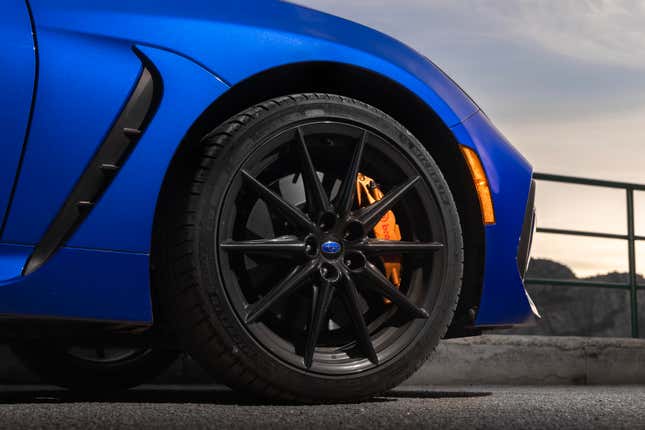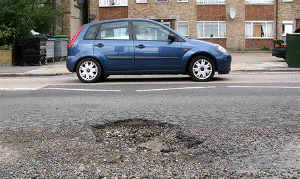The 2024 Subaru BRZ tS Is Still The One You Want, Even If You Aren't On The Targa Florio

The Targa Florio is easy enough to read about, you’ve probably come across plenty of photos of Porsches and Ferraris there. When you see a blue Porsche 908/3 with a big orange arrow running down the drivers side, you probably think “Targa Florio.” I certainly have for as long as I can remember. But having just come back from running the actual course in its largest configuration in the new Subaru BRZ tS and WRX tR, I have to admit I had no clue what the race was really about.
We’re Driving the 2024 Subaru Crosstrek, What Do You Want to Know?
Full Disclosure: Subaru wanted me to drive their cars on some incredible roads, so they flew me and a handful of other journalists to Sicily to retrace the route of the Targa Florio. They fed us well, and I had a couple of Negronis.
The BRZ tS is the wonderfully approachable little sports car we all love, but with upgraded brakes and suspension. The tS stands for “tuned by STI,” and what makes the car great is the apparent care that STI took to get the tuning right. Mechanically, the tS is just a BRZ: it has a naturally aspirated 2.4-liter flat four making 228 horsepower, a 6-speed manual transmission, a Torsen limited-slip diff, etc. But the tS also gets bigger Brembo brakes with 4-piston calipers in the front and two-piston calipers in the rear. Hitachi Sensitive Frequency Response Dampers are installed at the front, and on the roads that make up the old Targa Florio route, they were the star of the show.
Photo: Michael Shaffer/Subaru
The Targa Florio was run in different configurations over its 71-year history, but the one we ran was the largest, the Grande course. The 91-mile route is comprised of public roads and an incomprehensible 2000 (ish) corners. By comparison, the Nürburgring Nordschleife has 154 turns in its current configuration. In-period, Targa Florio drivers would run recce on the course prior to the race, often by affixing license plates to their race cars and mixing it up with everyday traffic. Saying that the course has around 2000 turns almost undersells it, though. No two corners are alike, there are massive changes in elevation and road surface, and the idea that a driver could ever really learn the Grande route is to me, an amateur, kind of preposterous.

Photo: Michael Shaffer/Subaru
I spent a day loafing around, stopping for incredible food and little coffees, but the prospect of attacking those roads at race speeds, with hay bales and flimsy guardrails to keep me from crunching spectators and/or launching off cliffs, was impossible to fathom.
Not long after we set out on the morning of our drive, we stopped in a small town to walk through a tiny basement workshop that had been turned into a Targa Florio museum by a beautifully enthusiastic local man. Walking down the gentle and slightly damp incline to the door, my sneakers lost their purchase and if I was not possessed with cat-like reflexes, I would have busted my ass, possibly terminally. I wasn’t the only one, and at one point we all kind of stood around taking note of how unusually slick the pavement in the parking lot and alley was.

Photo: Michael Shaffer/Subaru
Not long after leaving the museum, we learned that the roads on the rest of our route were paved with the same stuff and it was going to be damp-to-rainy for the rest of the day. It wasn’t a glare ice level of slipperiness, but I’ve definitely enjoyed better grip in the snow.
I can’t believe the road surface was quite as bad when they were running race cars there. A lot of the narrower portions of the route were badly washed out to the point where the pavement heaved and collapsed and had begun the long slide down the hillside. Luckily, local authorities made sure most of these were marked with little signs.
The conditions were not ideal for a super thorough evaluation, but here’s what I learned. The BRZ tS maintains the BRZs beloved tail-happy demeanor on the same 215/40R18 Michelin Pilot Sport 4 summer tires that the Limited gets. On the slow, slippery tarmac, anything more than careful throttle application would result in nice progressive oversteer. Anything more than that would result in, well, more than that. The upgraded brakes felt firm underfoot, but there wasn’t enough grip anywhere to really get a sense for how well they slowed the car. That said, generally speaking, more brake is better for stopping.

Photo: Michael Shaffer/Subaru
The big takeaway here is that while the brakes and some nice cosmetic touches distinguish the tS from the standard car, the two Hitachi dampers and the attendant tuning to the rear suspension are worth the entire premium, at least on the kinds of roads that we drove it on. Subaru will ask you to pay $2,650 more for a tS – it’s based on the BRZ Limited, which is $33,815 with destination and delivery, so the tS will cost you $36,465. Even over the worst of the heaving, Hitachi’s simple dual-mode mechanical dampers kept the BRZ planted and communicative. If we ever see a BRZ STI, I could imagine them at all four corners.
This is not a vastly different BRZ – the things that make the normal car good are still present, just augmented in a couple of places. If you plan to track your BRZ, paying $2,650 for better factory brakes and suspension is probably a better value than looking for the equivalent on the aftermarket. And while we didn’t get the full-breadth of driving experience I’d typically want for a review due to the conditions, from what I did experience I’m more than ready to say the sum of the tS is worth ponying up for if you’re in the market for an immersive, approachable and intuitive sports car experience.

Photo: Michael Shaffer/Subaru



